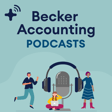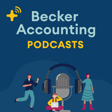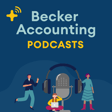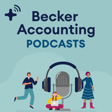
Tax News Now Ep. 1 - Introducing Mark Gallegos
Mark Gallegos, Tax Partner at Porte Brown, kicks off this 2025 tax discussion series. He shares what he loves about the tax profession, being very human-centric and focused on helping people. Learn from his expertise on the current tax landscape and his insights surrounding 2025 as an especially critical year, where tax provisions are set to expire and a new president will impact the results of new tax bills. Acknowledging the many uncertainties that tax professionals face regarding imminent changes in regulation, he highlights this as an opportunity to grow even closer client relationships.
Earn CPE by listening to this podcast through a Becker Prime CPE subscription.
Listen to this episode through your Becker LMS platform to complete practice questions, pass the final exam, and earn CPE credit.
Already a Becker Prime CPE customer? Login here.
Have access to Becker CPE through your employer? Earn CPE credit for this podcast however you consume Becker CPE, either through your company’s LMS or via the Becker platform. Not sure where to log in? Check with your CPE admin.
Learn more about CPE Podcasts from Becker: https://www.becker.com/cpe/becker-podcasts





